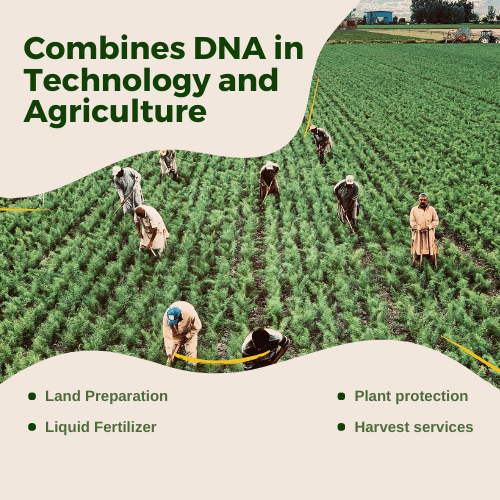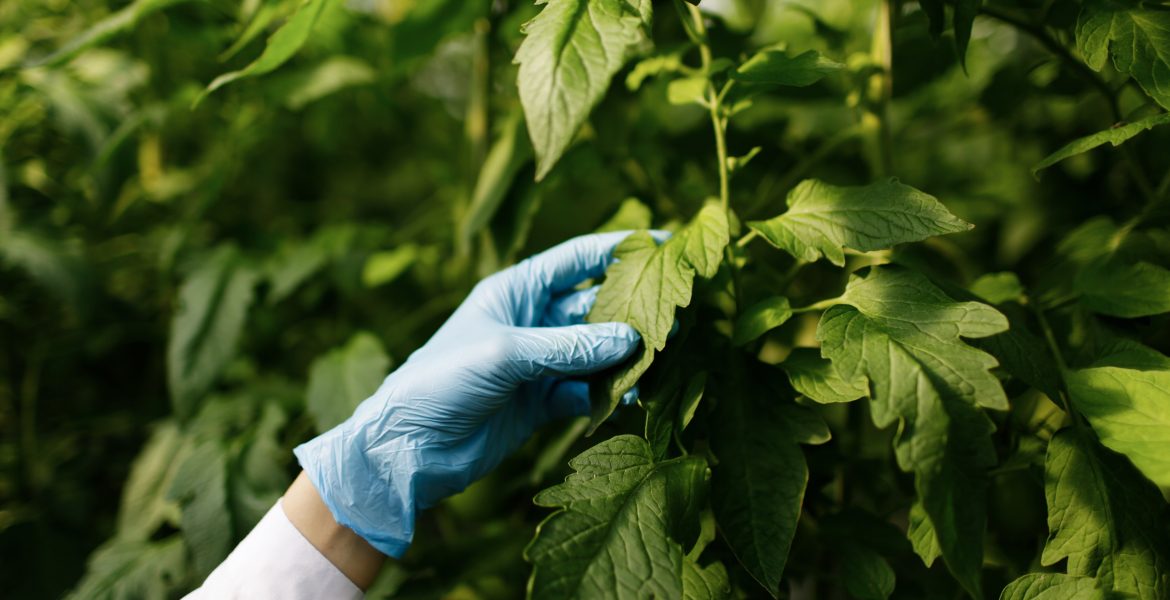Learn which career combines DNA technology and agriculture, offering opportunities in genetic research, crop improvement, and food security.
Technology and agriculture are genetics careers that combine DNA. Genetics integrates DNA technology to improve crops and livestock for enhanced productivity and sustainability.
By utilizing genetic engineering techniques, professionals in genetics play a vital role in developing new plant varieties and animal breeds, contributing to advancements in agriculture. This field offers opportunities to work on innovative solutions for improving food production and addressing agricultural challenges through the application of cutting-edge DNA technologies.
Embracing the intersection of DNA technology and agriculture, geneticists work towards creating a more resilient and efficient agricultural sector that can meet the demands of a growing global population while promoting environmental sustainability.

Introduction to Agricultural Biotechnology
Agricultural biotechnology is an exciting field that combines DNA technology and agriculture. This innovative sector offers numerous career opportunities for individuals interested in genetics, nutriceuticals, pharmaceuticals, and paternity testing. The integration of DNA technology in agriculture has revolutionized the industry, allowing for the development of new plant varieties and enhanced disease resistance through genetic engineering.
Professionals in this field play a crucial role in improving crop productivity and sustainability. Additionally, the application of DNA technology in agriculture has paved the way for advancements in environmental studies and forensics, making it a multifaceted and rewarding career choice for those passionate about both science and agriculture.
Biotechnology in forensic science
Biotechnology plays a crucial role in forensic science, revolutionizing how criminal investigations are conducted. At its core, biotechnology in forensic science involves using biological processes and tools to analyze evidence from crime scenes. This can include anything from DNA analysis to fingerprinting and even the study of microorganisms. By utilizing the advancements in biotechnology, forensic scientists can more accurately identify suspects, analyze evidence, and solve cases that would have been impossible to crack years ago.
One of the most well-known applications of biotechnology in forensic science is DNA profiling. DNA is unique to every individual (except identical twins), and by analyzing samples from blood, hair, skin, or other biological material left at a crime scene, forensic experts can match DNA to a suspect or rule someone out. This has become one of the most reliable methods of identifying criminals, and it’s also been used to exonerate innocent people who were wrongly convicted.
Another fascinating area is forensic toxicology, which uses biotechnology to analyze bodily fluids for the presence of drugs, alcohol, or other toxins. This can be vital in cases of poisoning or drug-related crimes. The use of biotechnology allows forensic scientists to detect even trace amounts of substances, making it easier to understand how someone died or what substances were involved in a crime.
Biotechnology is also improving fingerprint analysis. Traditional fingerprinting involves comparing patterns manually, but advancements in biotechnology have introduced methods that can extract genetic information from fingerprints, offering additional layers of evidence. Moreover, forensic scientists can use biotechnology to study microorganisms like bacteria and fungi left on objects or human bodies, which can provide timelines for when someone died or where they’ve been.
Forensic entomology, another branch enhanced by biotechnology, focuses on the study of insects found on decomposing bodies. By studying the genetic makeup of insects, forensic experts can determine the time of death more accurately. Biotechnology allows for precise identification of insect species, giving investigators more detailed insights into crime timelines.

Definition And Scope Of Agricultural Biotechnology
One career path that seamlessly integrates DNA technology and agriculture is genetics. Genetics professionals play a vital role in leveraging DNA technology to enhance agricultural practices. By utilizing genetic engineering techniques, they can develop new plant varieties with improved disease resistance and enhanced traits.
This process involves manipulating the plant’s genes through recombinant DNA technology, resulting in crops that are more resilient and productive. Genetics professionals contribute to the advancement of sustainable farming practices and the production of high-quality crops through their expertise in DNA technology and agriculture.
Genetic modification essay
Genetic modification, often referred to as genetic engineering, is a process where scientists alter the genetic material of living organisms, such as plants, animals, or microorganisms. This technique allows the transfer of specific genes from one organism to another, enabling changes that would not occur naturally. The purpose of genetic modification (GM) varies from improving agricultural crops to addressing health issues, and it has sparked both enthusiasm and controversy worldwide.
Applications in Agriculture
One of the most common uses of genetic modification is in agriculture. GM crops are designed to improve resistance to pests, diseases, and harsh environmental conditions like drought. For example, genetically modified corn and soybeans are resistant to herbicides and pests, reducing the need for chemical pesticides. These crops are also engineered for higher yields, better nutritional content, and a longer shelf life, which helps in feeding the growing global population. GM crops can be modified to withstand climate challenges, making them particularly valuable in regions suffering from extreme weather conditions.
Medical and Health Benefits
Genetic modification is also making significant strides in medicine. In the field of healthcare, genetic engineering has been used to produce insulin for diabetic patients and to develop vaccines. One promising application is gene therapy, which involves modifying human genes to treat or prevent diseases. Scientists are working on modifying defective genes that cause diseases like cystic fibrosis, muscular dystrophy, and some cancers. Moreover, GM bacteria are used to produce pharmaceuticals and vaccines, leading to more efficient and cost-effective treatments.
Genetically Modified Animals
In addition to plants, animals are also being genetically modified. One example is the AquaBounty salmon, which has been engineered to grow faster than regular salmon, making it more efficient to farm. Another example is genetically modified mosquitoes, which are altered to prevent them from spreading diseases like malaria. By modifying the mosquitoes’ genes, scientists can reduce the number of disease-carrying insects, potentially saving millions of lives.
Concerns and Ethical Issues
Despite its benefits, genetic modification has raised several concerns. Many people worry about the long-term environmental impacts of GM organisms. Critics argue that genetically modified crops may harm biodiversity by cross-breeding with wild plants or creating “superweeds” that are resistant to herbicides. There are also fears that GM foods could trigger allergies or other health problems in humans, although research has not found conclusive evidence supporting these claims.
Ethical concerns also surround the manipulation of genetic material, particularly when it comes to humans and animals. Some fear that genetic engineering could lead to unintended consequences, such as designer babies, where parents can choose traits like intelligence or appearance for their children. These concerns spark debates about where to draw the line between beneficial science and “playing God.”

Importance Of Integrating Dna Technology In Agriculture
The integration of DNA technology in agriculture has become increasingly important. This innovative approach has led to the development of new plant varieties through genetic engineering, using techniques like recombinant DNA technology. One significant application of DNA technology in agriculture is the modification of plant genes to enhance resistance to diseases.
By re-engineering plants to produce viral proteins, the technology has enabled farmers to decrease plant susceptibility to diseases. This advancement is revolutionizing agricultural practices and contributing to the production of healthier and more resilient crops. Additionally, DNA technology offers vast potential for further advancements in agricultural sustainability and productivity.
As the agricultural industry continues to evolve, the integration of DNA technology will play a pivotal role in shaping the future of farming and food production.
Careers in Agricultural Biotechnology
The combination of DNA technology and agriculture has opened up various career opportunities in the field of agricultural biotechnology. This innovative field allows professionals to explore careers in pharmaceuticals, paternity testing, nutriceuticals, and genetics. By leveraging DNA technology, individuals can contribute to the development of new plant varieties and improve resistance to diseases through genetic engineering techniques.
This not only benefits agricultural practices but also plays a crucial role in addressing global food security challenges. Furthermore, the application of DNA technology in agriculture offers promising prospects for enhancing crop yields, sustainability, and environmental conservation. As the demand for innovative solutions in agriculture continues to grow, careers in agricultural biotechnology present a dynamic and impactful path for those passionate about merging scientific advancements with agricultural practices.
Geneticist
DNA technology and agriculture combine in the field of genetics. Geneticists play a crucial role in utilizing DNA technology to enhance agricultural practices. By applying genetic engineering techniques, geneticists can modify plant genes to improve disease resistance and enhance overall crop yields.
This innovative approach to agriculture offers promising solutions to the challenges faced by the industry, such as increasing food demand and environmental sustainability. With a focus on the intersection of DNA technology and agriculture, geneticists contribute to shaping the future of sustainable and efficient farming practices.
Biotechnologist
Biotechnologists play a crucial role in merging DNA technology and agriculture. They utilize their expertise to develop genetically modified crops, improve crop resistance to diseases, and enhance overall crop yields. By using DNA technology, biotechnologists can create plants with specific traits and characteristics, such as drought tolerance and pest resistance.
This innovative approach to agriculture not only benefits farmers by increasing productivity but also contributes to sustainable farming practices. Additionally, biotechnologists also explore the potential of DNA technology in developing new pharmaceuticals, nutraceuticals, and paternity testing. Their work is pivotal in advancing the intersection of DNA technology and agriculture, making a significant impact on the future of farming and biotechnology.
Agronomist
Agronomists play a crucial role in combining DNA technology and agriculture. They utilize advancements in genetic engineering to enhance crop production, improve plant resistance to diseases, and develop new plant varieties. By integrating DNA technology into agricultural practices, agronomists contribute to sustainable farming methods and increased crop yields.
With a focus on genetics and plant biology, agronomists work to optimize agricultural processes and address challenges in food production. This career path offers a unique opportunity to blend scientific innovation with practical applications in the agricultural sector, making it a promising field for those interested in the intersection of technology and agriculture.
Skills And Qualifications For A Career In Agricultural Biotechnology
A career in agricultural biotechnology combines the advancements in DNA technology with the agricultural sector, offering a unique blend of skills and qualifications. Professionals in this field require a strong foundation in biological sciences, genetics, and molecular biology. Additionally, expertise in crop breeding, genetic engineering, and bioinformatics is essential.
Practical experience in laboratory techniques, data analysis, and research methodologies are also crucial for success in this career. Furthermore, a deep understanding of agricultural practices and environmental sustainability is vital for applying biotechnological solutions to enhance crop production and address agricultural challenges.
With the integration of DNA technology and agriculture, professionals in this field play a pivotal role in driving innovation, sustainability, and productivity in the agricultural sector.

Educational Requirements
A career that combines DNA technology and agriculture is genetics. Genetics plays a crucial role in utilizing DNA technology for agricultural purposes. By re-engineering plant genes through techniques such as recombinant DNA technology, new plant varieties can be developed to enhance resistance to diseases and improve overall crop yields.
The intersection of DNA technology and agriculture offers exciting opportunities for professionals in the field of genetics to contribute to advancements in sustainable farming practices and food production. The educational requirements for pursuing a career in this field typically involve a strong background in genetics, molecular biology, and agricultural sciences, along with specialized training in DNA technology applications specific to agriculture.
Technical Skills
A career that combines DNA technology and agriculture requires technical skills in both fields. Professionals in this career path need a strong understanding of genetics and biotechnology, as well as knowledge of agricultural practices. They could work in the nutraceutical industry, developing plant-based products with added health benefits.
They could also work on genetics research, developing new plant varieties with improved resistance to diseases or pests. Alternatively, they could work in the pharmaceutical industry, using DNA technology to develop new drugs or vaccines for livestock. Technical skills are essential for success in this career, as professionals need to be able to apply their knowledge to solve complex problems and drive innovation in both fields.
Soft Skills
A genetics career involves the fusion of DNA technology and agriculture. Genetics professionals utilize DNA technology to enhance agricultural practices, such as developing new plant varieties with increased disease resistance through genetic engineering. This field plays a crucial role in improving crop productivity and sustainability.
By applying DNA technology in agriculture, geneticists contribute to advancements in food production and environmental conservation. Careers in genetics offer a unique opportunity to merge scientific expertise with a passion for agriculture, making it an exciting and rewarding path for individuals interested in the intersection of biotechnology and farming.

Credit: studyinginswitzerland.com
Conclusion
Genetics is a career that combines DNA technology and agriculture. With the use of genetic engineering, plants can be re-engineered to produce viral proteins and decrease plant resistance to diseases. DNA technology is also used in agriculture to develop new plant varieties.
As the field of agriculture continues to evolve, there will be a growing need for professionals who can combine their knowledge of DNA technology and agriculture to meet these demands. A career in genetics offers a promising future for those interested in this exciting field.
How Is DNA Technology Used In Agriculture?
DNA technology in agriculture involves genetic engineering to create disease-resistant plant varieties, enhancing crop productivity and quality.
What Career Combines DNA Technology and Forensics?
The field of genetics involves the integration of DNA technology and forensic science in a professional setting. DNA analysts use DNA evidence collected from crime scenes to develop DNA profiles, which can exonerate or implicate someone in a crime. In agriculture, genetics is also used to decrease plant resistance to diseases by re-engineering the plant to produce viral proteins.
Which Career Combines DNA Technology And Agriculture Brainly?
Genetics is a career that combines DNA technology and agriculture, focusing on genetic manipulation for improved crops.







